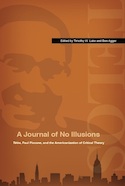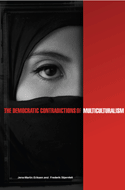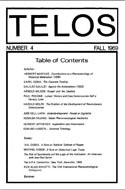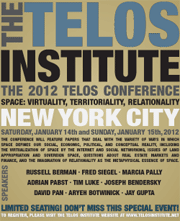By Telos Press · Thursday, March 22, 2012 The Midwest Book Review recommends A Journal of No Illusions:
 Anything of worth is worthy of criticism. A Journal of No Illusions: Telos, Paul Piccone, and the Americanization of Critical Theory traces the history behind the journal Telos, which contained many writings discussing the new direction of the American left, with much discussion of European social theory and its future and applications to our world. Paul Piccone created the journal and never expected it to grow to the place it has, and Timothy W. Luke and Ben Agger present an intriguing literary history behind the publication and where it has came from. A Journal of No Illusions is a fine pick for any journalistic studies collection discussing historic publications. Anything of worth is worthy of criticism. A Journal of No Illusions: Telos, Paul Piccone, and the Americanization of Critical Theory traces the history behind the journal Telos, which contained many writings discussing the new direction of the American left, with much discussion of European social theory and its future and applications to our world. Paul Piccone created the journal and never expected it to grow to the place it has, and Timothy W. Luke and Ben Agger present an intriguing literary history behind the publication and where it has came from. A Journal of No Illusions is a fine pick for any journalistic studies collection discussing historic publications.
Purchase your copy of A Journal of No Illusions here and save 20% off the list price.
Continue reading →
By Telos Press · Friday, March 16, 2012 Milan Vukomanovic reviews Jens-Martin Eriksen and Frederik Stjernfelt’s The Democratic Contradictions of Multiculturalism, now available in English translation from Telos Press.
 In its “soft” meaning multiculturalism is, according to these authors, quite compatible with the idea of democracy and liberal-democratic political culture. It concerns the freedom of an individual to choose culture, religion, worldview and identity that suits him/her, as long as that person does not represent an obstacle to freedom of others who also wish to affirm, or determine, themselves within their own individual rights, values, proclivities and norms. However, problems arise in the context of a “hard” interpretation of multiculturalism seen as a system that advocates inviolability, and even sovereignty, of collective cultural rights. In other words, as Eriksen and Stjernfelt argue, this is a version of multiculturalism based on the holiness and immunity of different cultures as their collective rights. . . . In its “soft” meaning multiculturalism is, according to these authors, quite compatible with the idea of democracy and liberal-democratic political culture. It concerns the freedom of an individual to choose culture, religion, worldview and identity that suits him/her, as long as that person does not represent an obstacle to freedom of others who also wish to affirm, or determine, themselves within their own individual rights, values, proclivities and norms. However, problems arise in the context of a “hard” interpretation of multiculturalism seen as a system that advocates inviolability, and even sovereignty, of collective cultural rights. In other words, as Eriksen and Stjernfelt argue, this is a version of multiculturalism based on the holiness and immunity of different cultures as their collective rights. . . .
Continue reading →
By Juan Carlos Donado · Thursday, March 15, 2012 As an occasional feature on TELOSscope, we highlight a past Telos article whose critical insights continue to illuminate our thinking and challenge our assumptions. Today, Juan Carlos Donado looks at Paul Piccone’s “Science, Art and Revolution: An Introduction to Galileo as a Poet,” from Telos 4 (Fall 1969).
 Even if Paul Piccone in fact mistakenly attributes the poem Contro Gli Aristotelici to Galileo—as scholars such as Charles B. Schmitt claim—the conclusion remains invariably the same. Piccone, of course, is not alone in this: the mistake originated in an early article written by the great Galilean scholar Antonio Favaro (1869–1922), responsible for the colossal twenty-volume edition of Galileo’s Opere. Favaro himself corrected the mistake one year later in a much lesser known article, but in print the attribution was already made and Jacopo Soldani’s satire, for years, was adopted by Galileo’s pen. Even if Paul Piccone in fact mistakenly attributes the poem Contro Gli Aristotelici to Galileo—as scholars such as Charles B. Schmitt claim—the conclusion remains invariably the same. Piccone, of course, is not alone in this: the mistake originated in an early article written by the great Galilean scholar Antonio Favaro (1869–1922), responsible for the colossal twenty-volume edition of Galileo’s Opere. Favaro himself corrected the mistake one year later in a much lesser known article, but in print the attribution was already made and Jacopo Soldani’s satire, for years, was adopted by Galileo’s pen.
Continue reading →
By Gary Shapiro · Thursday, March 8, 2012 This paper was presented at the 2012 Telos Conference, “Space: Virtuality, Territoriality, Relationality,” held on January 14–15, in New York City.
Nietzsche-Schmitt Dialogue
 Carl Schmitt’s TheNomos of the Earth and related work conduct a generally unacknowledged dialogue with Nietzsche; both Schmitt’s geophilosophy and Nietzsche’s politics of the earth are clarified by unearthing this dialogue. Schmitt rarely mentions Nietzsche in his published works (excepting Glossarium) and then to marginalize or distance him. Carl Schmitt’s TheNomos of the Earth and related work conduct a generally unacknowledged dialogue with Nietzsche; both Schmitt’s geophilosophy and Nietzsche’s politics of the earth are clarified by unearthing this dialogue. Schmitt rarely mentions Nietzsche in his published works (excepting Glossarium) and then to marginalize or distance him.
Nietzsche and Schmitt are both paradigmatic geophilosophical thinkers, in Deleuze and Guattari’s sense—they conceptualize territorialization, deterritorialization, and reterritorialization, and they raise questions about the future of the earth. Schmitt’s Nomos articulates problems of earthly order and orientation in the post-Columbian age. Nietzsche’s Zarathustra descends a mountain, calls on the urban multitude to think the direction of the earth (Sinn der Erde), even to sacrifice themselves for it. Later, he explicitly raises the question of hegemony—who will be the lords of the earth?
Continue reading →
By Mohammad Rafi · Tuesday, March 6, 2012 This paper was presented at the 2012 Telos Conference, “Space: Virtuality, Territoriality, Relationality,” held on January 14–15, in New York City.
 In 2004 the German national football team was invited to Azadi Stadium in Teheran for a friendly game against Iran’s national team. While the German anthem was being played before the game, a large number of Iranians collectively greeted their German guests by performing the Nazi salute. Although this display of naiveté came as a shock to millions of viewers on live German TV, it should not come as a surprise in light of Nazi Germany’s historical propagandist involvement in Iran. Whereas the history of the relations between the two nations dates back to 1873, an affinity was reinforced in the Weimar years and strengthened through the propagation of an Aryan myth during the Nazi reign. I will discuss two pivotal historical associations between Germany and Iran, one based on the Aryan myth grounded in racist ideology, the other connection concerns intellectual influences of German anti-modernists on Iranian thinkers. Both points serve to shed light on a relationship that demands awareness, especially now that tensions between the West and Iran are continuously increasing. In 2004 the German national football team was invited to Azadi Stadium in Teheran for a friendly game against Iran’s national team. While the German anthem was being played before the game, a large number of Iranians collectively greeted their German guests by performing the Nazi salute. Although this display of naiveté came as a shock to millions of viewers on live German TV, it should not come as a surprise in light of Nazi Germany’s historical propagandist involvement in Iran. Whereas the history of the relations between the two nations dates back to 1873, an affinity was reinforced in the Weimar years and strengthened through the propagation of an Aryan myth during the Nazi reign. I will discuss two pivotal historical associations between Germany and Iran, one based on the Aryan myth grounded in racist ideology, the other connection concerns intellectual influences of German anti-modernists on Iranian thinkers. Both points serve to shed light on a relationship that demands awareness, especially now that tensions between the West and Iran are continuously increasing.
Continue reading →
By Hamza Zeghlache · Friday, March 2, 2012 This paper was presented at the 2012 Telos Conference, “Space: Virtuality, Territoriality, Relationality,” held on January 14–15, in New York City.
 It is almost impossible to consider architecture independently from space. Indeed, the definition of architecture should implicitly or explicitly include this concept. The first role of architecture is to create and manipulate space. Any architectural object is not only a contained element in space but also an element that participates in the orientation of space and therefore in the making of a place out of a space. Moreover, the architectural object makes space act within a performing stage and defines it as a closed or open space. There is no architecture or architectural action without space. The human use of space and values with which society imbues spatial relations signifies the ground of architecture. It is almost impossible to consider architecture independently from space. Indeed, the definition of architecture should implicitly or explicitly include this concept. The first role of architecture is to create and manipulate space. Any architectural object is not only a contained element in space but also an element that participates in the orientation of space and therefore in the making of a place out of a space. Moreover, the architectural object makes space act within a performing stage and defines it as a closed or open space. There is no architecture or architectural action without space. The human use of space and values with which society imbues spatial relations signifies the ground of architecture.
Continue reading →
|
|
 Anything of worth is worthy of criticism. A Journal of No Illusions: Telos, Paul Piccone, and the Americanization of Critical Theory traces the history behind the journal Telos, which contained many writings discussing the new direction of the American left, with much discussion of European social theory and its future and applications to our world. Paul Piccone created the journal and never expected it to grow to the place it has, and Timothy W. Luke and Ben Agger present an intriguing literary history behind the publication and where it has came from. A Journal of No Illusions is a fine pick for any journalistic studies collection discussing historic publications.
Anything of worth is worthy of criticism. A Journal of No Illusions: Telos, Paul Piccone, and the Americanization of Critical Theory traces the history behind the journal Telos, which contained many writings discussing the new direction of the American left, with much discussion of European social theory and its future and applications to our world. Paul Piccone created the journal and never expected it to grow to the place it has, and Timothy W. Luke and Ben Agger present an intriguing literary history behind the publication and where it has came from. A Journal of No Illusions is a fine pick for any journalistic studies collection discussing historic publications.  In its “soft” meaning multiculturalism is, according to these authors, quite compatible with the idea of democracy and liberal-democratic political culture. It concerns the freedom of an individual to choose culture, religion, worldview and identity that suits him/her, as long as that person does not represent an obstacle to freedom of others who also wish to affirm, or determine, themselves within their own individual rights, values, proclivities and norms. However, problems arise in the context of a “hard” interpretation of multiculturalism seen as a system that advocates inviolability, and even sovereignty, of collective cultural rights. In other words, as Eriksen and Stjernfelt argue, this is a version of multiculturalism based on the holiness and immunity of different cultures as their collective rights. . . .
In its “soft” meaning multiculturalism is, according to these authors, quite compatible with the idea of democracy and liberal-democratic political culture. It concerns the freedom of an individual to choose culture, religion, worldview and identity that suits him/her, as long as that person does not represent an obstacle to freedom of others who also wish to affirm, or determine, themselves within their own individual rights, values, proclivities and norms. However, problems arise in the context of a “hard” interpretation of multiculturalism seen as a system that advocates inviolability, and even sovereignty, of collective cultural rights. In other words, as Eriksen and Stjernfelt argue, this is a version of multiculturalism based on the holiness and immunity of different cultures as their collective rights. . . .  Even if Paul Piccone in fact mistakenly attributes the poem Contro Gli Aristotelici to Galileo—as scholars such as Charles B. Schmitt claim—the conclusion remains invariably the same. Piccone, of course, is not alone in this: the mistake originated in an early article written by the great Galilean scholar Antonio Favaro (1869–1922), responsible for the colossal twenty-volume edition of Galileo’s Opere. Favaro himself corrected the mistake one year later in a much lesser known article, but in print the attribution was already made and Jacopo Soldani’s satire, for years, was adopted by Galileo’s pen.
Even if Paul Piccone in fact mistakenly attributes the poem Contro Gli Aristotelici to Galileo—as scholars such as Charles B. Schmitt claim—the conclusion remains invariably the same. Piccone, of course, is not alone in this: the mistake originated in an early article written by the great Galilean scholar Antonio Favaro (1869–1922), responsible for the colossal twenty-volume edition of Galileo’s Opere. Favaro himself corrected the mistake one year later in a much lesser known article, but in print the attribution was already made and Jacopo Soldani’s satire, for years, was adopted by Galileo’s pen.  Carl Schmitt’s TheNomos of the Earth and related work conduct a generally unacknowledged dialogue with Nietzsche; both Schmitt’s geophilosophy and Nietzsche’s politics of the earth are clarified by unearthing this dialogue. Schmitt rarely mentions Nietzsche in his published works (excepting Glossarium) and then to marginalize or distance him.
Carl Schmitt’s TheNomos of the Earth and related work conduct a generally unacknowledged dialogue with Nietzsche; both Schmitt’s geophilosophy and Nietzsche’s politics of the earth are clarified by unearthing this dialogue. Schmitt rarely mentions Nietzsche in his published works (excepting Glossarium) and then to marginalize or distance him. 

